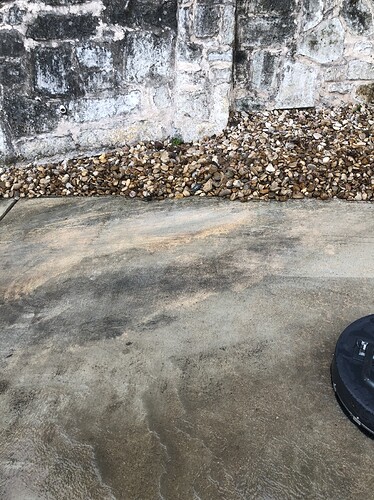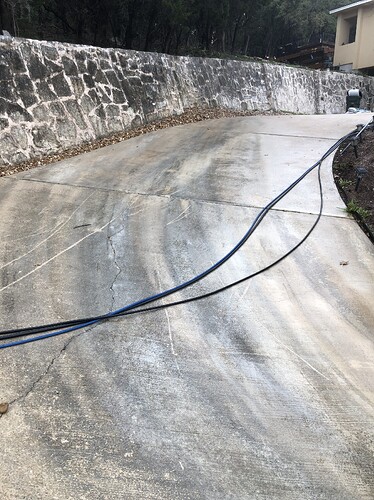I’d call Craig Harrison (F9 guy).
Have you tried direct SH (diluted or full strength - it is concrete right?) application?
If full strength 12.5% SH does nothing, then you are looking at an acid solution. @Patriotspwashing advice to contact Craig is the way to go if you not already familiar with acid treatments for concrete.
BTW - you are in my neck of the woods. If you ever need help, let me know.
Yeah man i saw u out at the Dell Diamond. Will def reach out soon.
I’d go with what @CFH said and try neat SH in a spot.
There’s many jobs over my way where the mould is too deep for the SC to get it.
Increasing pressure is not an option, so yeah, give it a go as it will be the least expensive option too 
This is not a job for SH… call Craig or contact Eaochem, I think they make one restore.
I know they have a chemical that is made specifically to melt tar. I think it’s literally called tar melt lol.
Hate to say it, ur your not going to get good answers here. We are bleach guys lol
Tar? Are you saying that’s tar and not mould?
“Tar like” I would say. Honestly idk what that is. I originally thought it was from the french drain rock in the photo. But as I recall the customer said the drain was added after the fact. So this build up was there before the rock. This location sits on caliche and limestone. So maybe SH and heat was the solution. Like I said above the customer was happy that the stain lifted so I ran with that. I’m just not too pleased.
From the steep driveways I’ve cleaned over the years (too many, ask my ankles!) I’ve found three things that typically stain/mark it.
Rust - nope.
Rubber from tire marks - nope.
Mould. It’s on the wall too. That retaining wall is the reservoir and that why it’s so bad. Deeply wet and a source of food from the soil behind the wall.
I might be wrong, but I’m 99% sure neat SH will disappear it for you 
Hope so!
I agree with Steve. Easy enough to find out though. Go hit a small spot with some degreaser mixed with about 4-5%SH and see what happens. Let dwell about 10-15min.
How strong did you use the One Restore? See which one works - acid or alkaline.
I wish I had the cojones to lay sh down before I started surface cleaning. I guess a test a spot would have been more than ideal. Just didn’t want the fuzz to give me any problems which would have costed more than what I made here in fines. And ultimately the customer was satisfied. And yes the incline was steep. I slipped a few times
Used the one restore straight. Although the surface was already wet/moist when I applied it. So idk about dilution. I didn’t think about degreaser. Didn’t have much ebc on me anyways.
Against what people have said here before - pretreatment of SH onto a dry porous surface, which has organic growth on it won’t run-off into the drain.
Why?
° It’s super absorbent, it soaks right in. Deep.
° The heat makes SH dissipate much faster.
° The actual SH oxidises the mould and the potency is dramatically reduced due to this chemical reaction.
All of that combined with the dwell time and exposure to air over a wide, hot area means you’re not washing 12.5% SH down the drain. More like salt.
There’s no harm in going back. I’d say that I’ve got a new treatment or improved my process/mix. You might not get paid for it, but you’ll know it was perfect and the customer will be super happy you insist on an excellent job.
If it doesn’t work - wait…it will 
You’re right. If I’ve got a job with a wall like that, I’ll hit it first thing with my roof mix. Go do whatever else I’ve got to do on the site and come back 3-4 hours later with my adjustable wand at probably 1000-1200 psi and that stuff literally just falls off of there.
Don’t know if this is similar or not, but a project I have that I am trying to get the owner to fully understand.
Office building - this is the driveway from the street to the back parking lot.
Has this black stuff on caked on. It is the result of poor drainage, so water mixes with the various fluids dripped from cars, mixed with dirt, mold, etc and pools. Then the sun evaporates the water and bakes on what is left onto the surface.
Picture 1 shows the edge of this area.
Picture 2 shows hitting it with just a wire brush. You can see it is gummy.
Picture 3 was hitting it with a degreaser of 25% Sodium Hydroxide and 10% butyle and scrubbing hard.
Picture 4 shows the spot test for degreaser and then 2 spot test for acid wash with scrubbing. I ran the acid at a 10:1 mix ratio and used a stiff nylon bristle brush. Took several applications on the spot test but it does all come up.
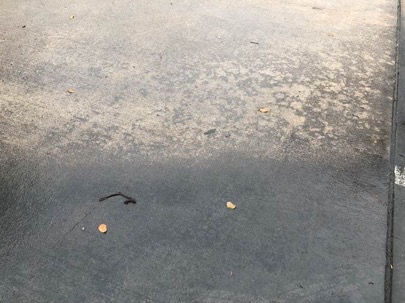
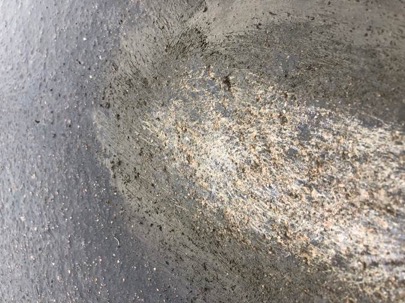
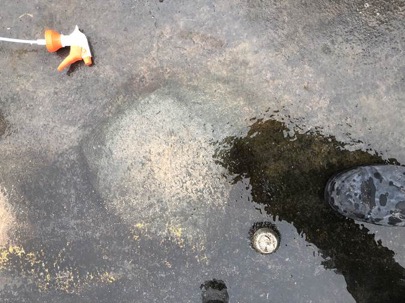
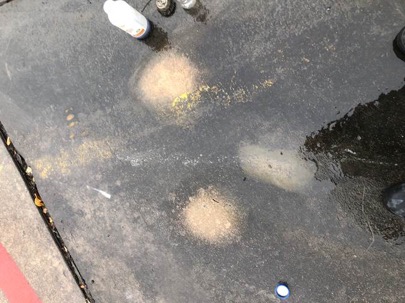
Like you, I could use the red tip and etch through it, but that would take days. Total area is around 2000 sq ft.
The property manager per owners request wants me to clean it 5 months in a row but I keep showing them that surface cleaning is not going to get it done, yet they won’t seem to listen or react to the pictures I keep sending. Interesting to interact with people who you present clear evidence will choose to ignore it. It is not really about money either. The cost to do a single acid wash treatment would actually be less than 5 regular cleanings. It is not about chem run-off as they have what we call around here a retention pond - it is designed to capture all run-off and then evaporate away the water so no worries about the chem. I just don’t get why they are insisting on just regular cleaning.
I hit it with SH/Degreaser and 180 degree hot water already with no change.
I feel bad taking their money for regular cleaning as I know it won’t do anything, but I am presenting all the information, pictures, examples, and discussion to make sure they fully understand they will be paying me to do essentially nothing (well I will clean, but the results will not change).
Ive seen a pretty black restaurant entrance cleaned up with f13 and hot water, and Ive read that gutter ZeP is real similar in results if that is more readily available to you.
WHAT!!! WHAT!!!
NOOOOOOOOOOOOOOOOOOOOOOOO
Please don’t spread that information to newbies.
I’ve already went rounds with him on this…
His statement was a jab at me…
I won’t argue with him on this topic again, but please stop giving people bad advice
Hey @CaCO3Girl can you correct it then please? I’ve changed it to the opposite as you seem like you’re very angry (bold text) and shouting.
° Dry concrete isn’t absorbent.
° Heat doesn’t make SH dissipate quicker.
° SH doesn’t react with mould and oxidise.
° The SH you pour out will be the same strength that hits the drains.
 I don’t believe that’s correct though.
I don’t believe that’s correct though.
Honestly, I don’t appreciate your manner what so ever. You could just reply and say it’s wrong? Or what is correct more importantly.
“NO NO NO NOOOOOO!!!” Just seems a little over the top?
I understand you are well-liked as the chemist (and a nice person probably) on here - so I’ll prepare for the onslaught of people agreeing with you etc.
@Patriotspwashing not at all. As I remember, we “shook hands” and moved on? Apparently not.
This post has nothing to do with you, seriously 
